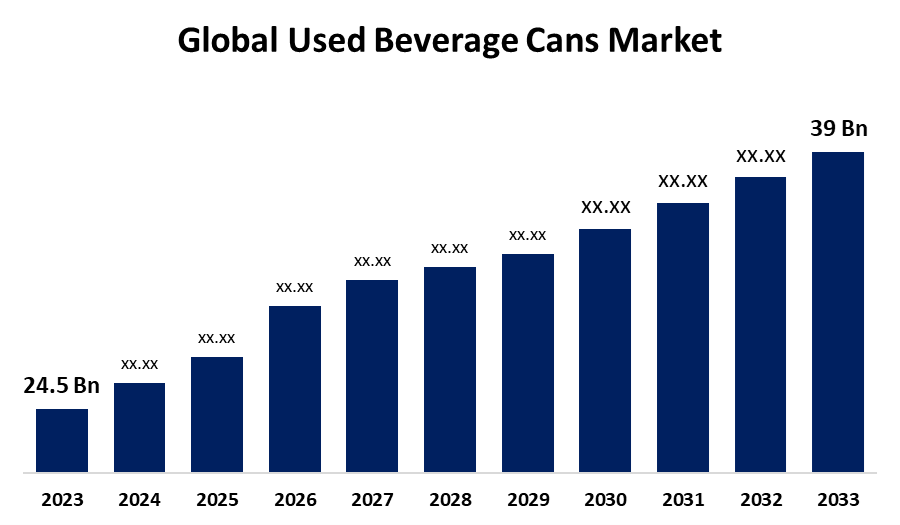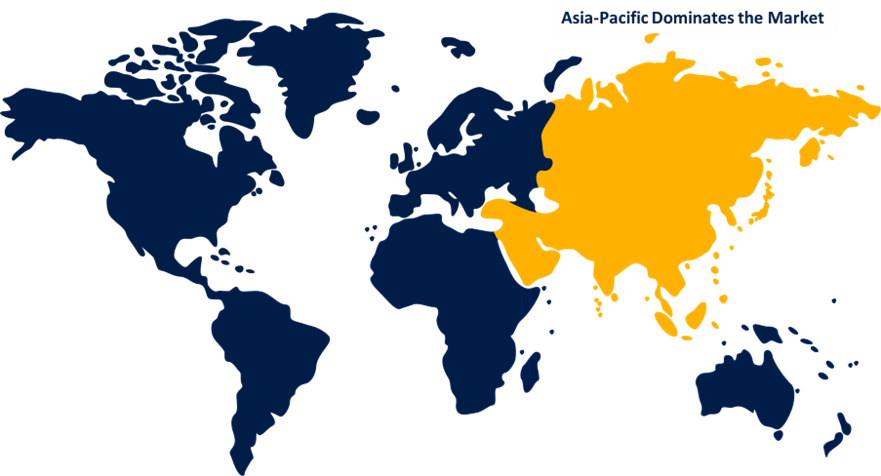Global Used Beverage Cans Market Size, Share, and COVID-19 Impact Analysis, By Material Type (Aluminum, Steel, and Others), By Recycling Process (Closed-Loop Recycling, Open-Loop Recycling), By Application (Carbonated Soft Drinks, Alcoholic Beverages, Fruit and Vegetable Juices, and Others), and By Region (North America, Europe, Asia Pacific, Latin America, Middle East, and Africa), Analysis and Forecast 2023 - 2033
Industry: Advanced MaterialsGlobal Used Beverage Cans Market Insights Forecasts to 2033
- The Global Used Beverage Cans Market Size was Valued at USD 24.5 Billion in 2023
- The Market Size is Growing at a CAGR of 4.76% from 2023 to 2033
- The Worldwide Used Beverage Cans Market Size is Expected to Reach USD 39 Billion by 2033
- Latin America is Expected to Grow the fastest during the forecast period.

Get more details on this report -
The Global Used Beverage Cans Market Size is anticipated to exceed USD 39 Billion by 2033, growing at a CAGR of 4.76% from 2023 to 2033. The used beverage cans (UBC) market benefits from the increase in beverage consumption, sustainability efforts, and recyclability of aluminum. Technological advancements, circular economy practices, and corporate commitments to eco-friendly packaging are some of the drivers that fuel growth in demand for efficient recycling solutions worldwide.
Market Overview
Used beverage cans (UBCs) are empty cans that have been used before to contain beverages such as soft drinks, juices, or alcoholic drinks. These cans are collected for recycling and repurposing since aluminum is a very recyclable material, retaining its quality through the recycling process, making UBCs a key material in sustainable packaging and environmental conservation efforts. Moreover, the used beverage cans (UBC) market thrives with increasing environmental awareness, strict regulations of the circular economy, and infinite recyclability of aluminum. Steady supply is ensured by growing beverage consumption, and recycling remains more cost-effective and energy-efficient compared to raw aluminum production. Technological advances in processing efficiency, as well as corporate sustainability goals driving demand for green packaging and partnerships with UBC recyclers, help grow the market. Furthermore, opportunities in the UBC market are being seen in increased infrastructure for recycling, greater take-up of eco-friendly packaging, and government incentives. Trends include advanced recycling technologies, rising consumption of beverages, and corporate commitments to reduce carbon footprints by practising circular economies.
Report Coverage
This research report categorizes the global used beverage cans market based on various segments and regions forecasts revenue growth and analyzes trends in each submarket. The report analyses the key growth drivers, opportunities, and challenges influencing the global used beverage cans market. Recent market developments and competitive strategies such as expansion, product launch, and development, partnership, merger, and acquisition have been included to draw the competitive landscape in the market. The report strategically identifies and profiles the key market players and analyses their core competencies in each sub-segment of the global used beverage cans market.
Global Used Beverage Cans Market Report Coverage
| Report Coverage | Details |
|---|---|
| Base Year: | 2023 |
| Market Size in 2023: | USD 24.5 Billion |
| Forecast Period: | 2023-2033 |
| Forecast Period CAGR 2023-2033 : | 4.76% |
| 2033 Value Projection: | USD 39 Billion |
| Historical Data for: | 2021-2022 |
| No. of Pages: | 210 |
| Segments covered: | By Material Type, By Recycling Process and COVID-19 Impact Analysis |
| Companies covered:: | Novelis Inc., Ardagh Group, Tata Steel Limited, Crown Holdings, Inc., Ball Corporation, Aleris Recycling, Sims Metal Management, Amcor Limited, Alcoa Corporation, UACJ Corporation, Norsk Hydro ASA, Kaiser Aluminum Corporation, and Others key players |
| Pitfalls & Challenges: | COVID-19 Empact, Challenge, Future, Growth, & Analysis |
Get more details on this report -
Driving Factors
The UBC market is influenced by increasing environmental awareness, rigorous government regulations encouraging recycling, and the infinite recyclability of aluminum. Increasing global beverage consumption will continue to provide an ample supply of used cans; the cost-effectiveness and energy efficiency of recycling compared with primary aluminum production further support the market demand. Technological improvements in sorting and processing continue to make recycling more efficient and increasingly corporate sustainability goals augment the demand for UBCs as part of sustainable packaging and circular economy initiatives. For instance, in 2024, Novelis Inc., the world's leading sustainable aluminum solutions provider and the world leader in aluminum rolling and recycling, today announced it is investing around $90 million to expand its used beverage cans (UBCs) recycling capacity at its Latchford, UK plant. The project will increase the facility's recycling capacity for UBCs by 85 kilotons per year, or more than 100%.
Restraints & Challenges
The UBC market is challenged by lack of adequate recycling infrastructure in developing regions and high investment required for advanced recycling technologies. Contamination of used cans reduces efficiency in processing while unstable aluminum prices or poor consumer awareness hamper a consistent supply and profit from recycling operations.
Market Segmentation
The global used beverage cans market share is classified into material type, recycling process, and application.
- The aluminum segment is expected to hold the largest share of the global used beverage cans market during the forecast period.
Based on material type, the global used beverage cans market is categorized as aluminum, steel, and others. Among these, the aluminum segment is expected to hold the largest share of the global used beverage cans market during the forecast period. This is because aluminum is light, infinitely recyclable without losing quality, and is used in the packaging of most beverages. Aluminum cans are much cheaper to recycle than to produce from primary production, making them a favourite for manufacturers. Moreover, the growing emphasis on sustainability and circular economy practices further enhances aluminum's position in the UBC market.
- The closed-loop recycling segment is expected to grow at the fastest CAGR during the forecast period.
Based on the recycling process, the global used beverage cans market is categorized as closed-loop recycling and open-loop recycling. Among these, the closed-loop recycling segment is expected to grow at the fastest CAGR during the forecast period. This growth is driven by its sustainability advantages: it enables aluminum cans to be recycled directly into new beverage cans without losing quality. It follows circular economy principles, thereby lowering energy consumption and greenhouse gas emissions as compared to open-loop recycling. The increased emphasis of corporates and governments on green practices supports this rapid adoption of closed-loop recycling.
- The carbonated soft drinks segment is expected to hold the largest share of the global Used Beverage Cans market during the forecast period.
Based on application, the global used beverage cans market is categorized as carbonated soft drinks, alcoholic beverages, fruit and vegetable juices, and others. Among these, the carbonated soft drinks segment is expected to hold the largest share of the global used beverage cans market during the forecast period. This is because soft drinks are consumed highly worldwide, and most of them are packaged in aluminum cans due to their light weight, durability, and excellent recyclability. Moreover, the popularity of ready-to-drink beverages and the adoption of canned soft drinks in emerging markets are also propelling this segment to lead.
Regional Segment Analysis of the Global Used Beverage Cans Market
- North America (U.S., Canada, Mexico)
- Europe (Germany, France, U.K., Italy, Spain, Rest of Europe)
- Asia Pacific (China, Japan, India, Rest of APAC)
- South America (Brazil and the Rest of South America)
- The Middle East and Africa (UAE, South Africa, Rest of MEA)
Asia Pacific is projected to hold the largest share of the global used beverage cans market over the forecast period.

Get more details on this report -
Asia Pacific is projected to hold the largest share of the global used beverage cans market over the forecast period. Increasing consumption of beverages coupled with rapid urbanization and environmental concerns in emerging markets like China, India, and most Southeast Asian nations fuels the growth. Strong recycling legislation by regional governments together with sustainable development promotion tend to increase the demand for UBC recycling. Secondly, the ever-growing population of the middle class plus investments in the infrastructure for the recycling process continue to push high growth in this region.
Latin America is expected to grow at the fastest CAGR growth of the global used beverage cans market during the forecast period. This growth is spurred by the increasing demand for canned beverages, especially carbonated soft drinks and alcoholic beverages, as disposable incomes grow in countries such as Brazil and Mexico. Furthermore, the growth in environmental awareness and government efforts to develop recycling infrastructure and promote sustainable practices also drive the growth of the UBC market in the region.
Competitive Analysis:
The report offers the appropriate analysis of the key organizations/companies involved within the globally used beverage cans market along with a comparative evaluation primarily based on their product offering, business overviews, geographic presence, enterprise strategies, segment market share, and SWOT analysis. The report also provides an elaborative analysis focusing on the current news and developments of the companies, which includes product development, innovations, joint ventures, partnerships, mergers & acquisitions, strategic alliances, and others. This allows for the evaluation of the overall competition within the market.
List of Key Companies
- Novelis Inc.
- Ardagh Group
- Tata Steel Limited
- Crown Holdings, Inc.
- Ball Corporation
- Aleris Recycling
- Sims Metal Management
- Amcor Limited
- Alcoa Corporation
- UACJ Corporation
- Norsk Hydro ASA
- Kaiser Aluminum Corporation
- Others
Key Target Audience
- Market Players
- Investors
- End-users
- Government Authorities
- Consulting And Research Firm
- Venture capitalists
- Value-Added Resellers (VARs)
Market Segment
This study forecasts revenue at global, regional, and country levels from 2020 to 2033. Spherical Insights has segmented the global used beverage cans market based on the below-mentioned segments:
Global Used Beverage Cans Market, By Material Type
- Aluminum
- Steel
- Others
Global Used Beverage Cans Market, By Recycling Process
- Closed-Loop Recycling
- Open-Loop Recycling
Global Used Beverage Cans Market, By Application
- Carbonated Soft Drinks
- Alcoholic Beverages
- Fruit and Vegetable Juices
- Others
Global Used Beverage Cans Market, By Regional
- North America
- US
- Canada
- Mexico
- Europe
- Germany
- UK
- France
- Italy
- Spain
- Russia
- Rest of Europe
- Asia Pacific
- China
- Japan
- India
- South Korea
- Australia
- Rest of Asia Pacific
- South America
- Brazil
- Argentina
- Rest of South America
- Middle East & Africa
- UAE
- Saudi Arabia
- Qatar
- South Africa
- Rest of the Middle East & Africa
Frequently Asked Questions (FAQ)
-
1. What is the CAGR of the global used beverage cans market over the forecast period?The global used beverage cans market size is expected to grow from USD 24.5 billion in 2023 to USD 39 billion by 2033, at a CAGR of 4.76% during the forecast period 2023-2033.
-
2. Which region is expected to hold the highest share of the global used beverage cans market?Asia Pacific is projected to hold the largest share of the global used beverage cans market over the forecast period.
-
3. Who are the top key players in the global used beverage cans market?Novelis Inc., Ardagh Group, Tata Steel Limited, Crown Holdings, Inc., Ball Corporation, Aleris Recycling, Sims Metal Management, Amcor Limited, Alcoa Corporation, UACJ Corporation, Norsk Hydro ASA, Kaiser Aluminum Corporation., and Others.
Need help to buy this report?